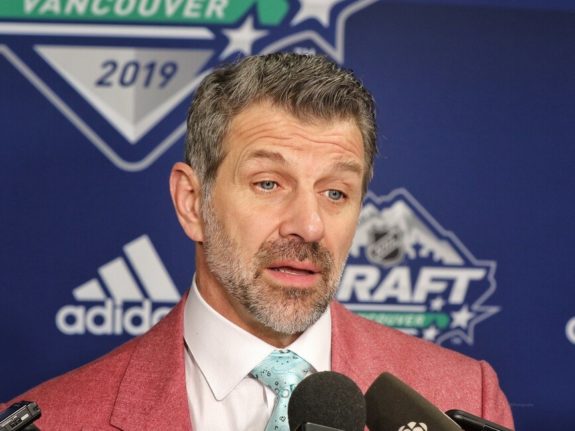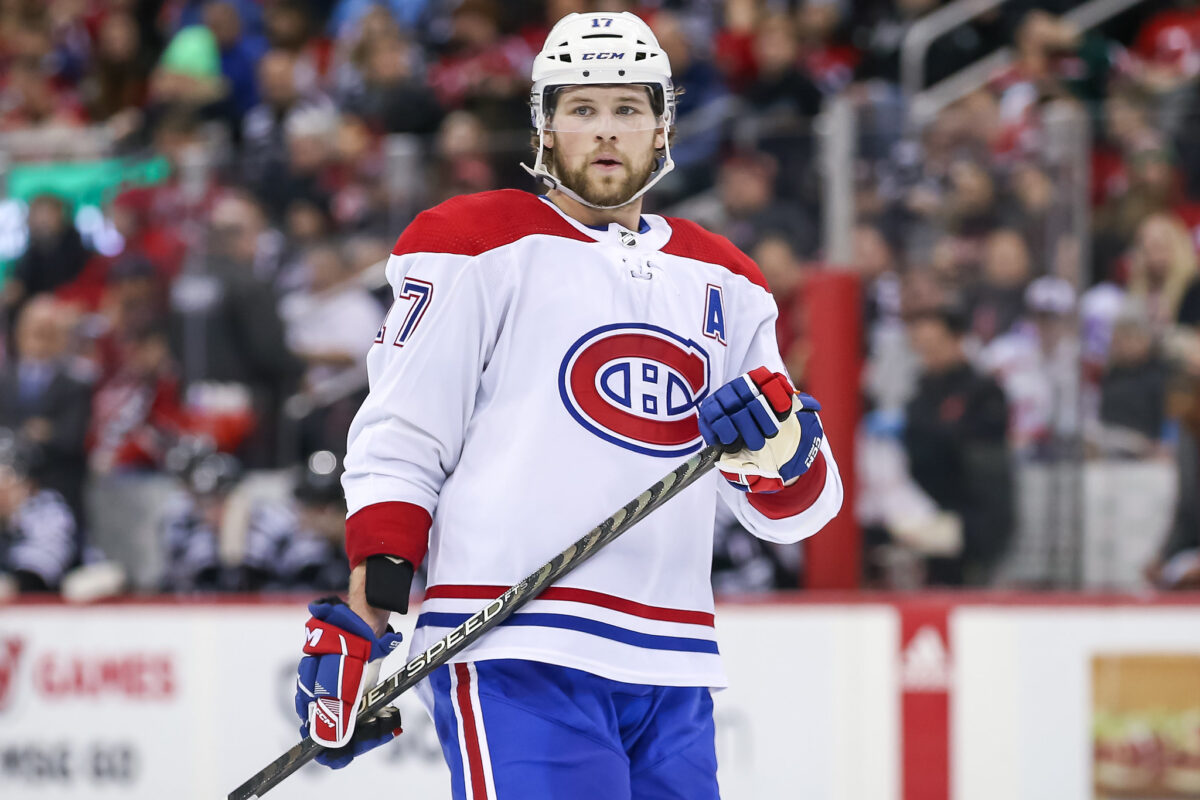The Montreal Canadiens are in a rebuild and trying their best to get skilled young players with reasonable contracts. So far, they have signed young stars like Nick Suzuki and Cole Caufield to long-term, fair contracts while remaining under the salary cap. They also signed recent acquisitions Kirby Dach and Alex Newhook to medium-term contracts in hopes they would be highly rewarding on the ice and quickly re-signed once some larger contracts came off the board. Those larger contracts seem to haunt the new general manager (GM) Kent Hughes regarding signing players now. He does have room to work, but not the room he should have on a rebuilding team that needs an elite star player.
Bergevin’s Mistakes as Canadiens GM Were Costly
Marc Bergevin was the Canadiens’ GM for ten seasons from 2012 to 2022. In that period, you can argue he was the most successful Montreal GM since Serge Savard. The team went to the Eastern Conference Final (ECF) twice, won their division three times and had four 100-point seasons — if you average 2012-13, the lockout season to 82 games. Montreal made it to the NHL Stanley Cup Final in 2021 for the first time since 1993. They also missed the playoffs three times and drafted in the top three twice. Bergevin was also pretty good at getting the best out of a trade. He didn’t “win” them all, but most of the time, he got the best out of the deals he made.

He wasn’t good at drafting and developing players; his top three picks were considered busts. Alex Galchenyuk hit 30 goals, but he was an off-ice nightmare and never came close to that mark again. Jesperi Kotkaniemi was drafted because the Canadiens needed a center in a draft class that was very weak at center. He never scored more than 43 points in a season, even after he signed with the Carolina Hurricanes. Other notable first-round misses are Michael McCarron, Ryan Poehling, and Nikita Scherbak. One of his worst moves was trading highly skilled prospect Mikail Sergachev to the Tampa Bay Lightning for Jonathan Drouin. Sergachev ended up being a top defenceman in the NHL, while Drouin struggled to play on the Habs’ top lines.
When it came to signing players to contracts, Bergevin was very stubborn with some, like PK Subban, who wanted a long-term contract but only got a bridge deal. After that, the two had terrible negotiations before Subban finally got his $9 million long-term contract but was traded after the second year of it. Then there was Andrei Markov, who Bergevin let walk over an extra year added to the contract, much to fans’ dismay, and just ten games shy of 1,000. When it was time to sign some more recent players like Brendan Gallagher and Josh Anderson, it seemed like Bergevin had an open wallet, and the new GM Hughes is now stuck with these almost untradeable players.
Gallagher Gives Everything He Has for the Canadiens but Not Worth the Cost
There is no question that Gallagher is a warrior and gives his all on the ice for the Canadiens. He has scored over 20 goals four times and over 30 twice, with a career-high of 33. His goals are not easy, either, mostly coming from in front of the net, where the 5-foot-9 player gets roughed up constantly. Even though he is one of the team’s smaller players, he is always involved in the rough areas like the corners, in front of the net, and anywhere he needs to be to get the puck.
His leadership is also a vital part of a young Habs team where he has taken players like Caufield under his wing and helped them improve their game. In Bergevin’s last season, Gallagher’s contract was over, and he needed to be re-signed. With his production history and leadership value, Bergevin wanted him long-term, and in the end, he got what he wanted for $6.5 million. This may not seem bad for a multiple 30-goal scorer, but the timing of this long-term high contract didn’t make sense.
Related: Canadiens Should Leverage Salary Retention at Trade Deadline
When Bergevin signed Gallagher to his current contract, Gallagher was 29 years old and coming off an injury-filled, shortened season where he scored 14 goals and 23 points in 35 games. Although he was still on pace for over 30 goals that season, his play in the playoffs proved he was running out of gas. The Stanley Cup run in 2021 was long and hard, and few on the Canadiens played harder than Gallagher. His production wasn’t high, only six points and two goals in 22 games, but he played with all heart and determination.
The Cup run also showed that Gallagher’s tank was running low and that his style of play would soon catch up to him. Ignoring all this, Bergevin went with emotion and signed Gallagher to his current contract. This proved to be a fatal mistake and became one of the worst contracts in Montreal to date. Since his re-signing, Gallagher has yet to play more than 56 games or score more than nine goals. So far this season, he is on pace to play 77 games and score 13 goals and 24 points.
Hughes is now stuck with this albatross of a contract for a regressing player who struggles to play top-six minutes on a depleted team for the next three seasons. Unless Hughes can charm another GM to take Gallagher’s contract, it will consume much-needed cap space that could be used to sign elite talent.
Canadiens Have No Answers for What’s Wrong with Anderson
Anderson has been mired in a slump that never seems to be ending. The power forward is a rugged goal scorer prone to the odd slump, but nothing like what is being seen this season. When Bergevin traded for Anderson in the summer of 2020 for Max Domi, it was thought the team would get a power forward like the one they missed out on in the 2018 draft — Brady Tkachuk.
Anderson’s production progressed nicely, increasing his goal and points total each season for the Columbus Blue Jackets. In 2018-19, the then-young forward scored 27 goals and 47 points. The following season, however, he suffered a severe shoulder injury and only played 26 games. This didn’t stop Bergevin from acquiring him despite the red flags. He had hoped the injury would not slow Anderson down and that he could return to an almost 30-goal pace.

Anderson didn’t disappoint in 2020-21, his first season with the Canadiens, scoring 17 goals in 52 games, a pace of 27 goals in an 82-game season. Injuries hampered him the next two seasons, where he only played 69 games in each, getting 32 points in both. He scored 19 and 21 goals in those next two seasons, respectfully, showing the Canadiens he could be a consistent 20-goal scorer.
Then, this season, Anderson started slumping but has done everything he could to work hard and help the team. You could argue that Anderson was snakebitten: he was getting shots and creating chances but getting nothing for it. After his first 23 games, he had two points and zero goals. Then December rolled around, and the Canadiens’ power forward started getting results from his hard work; in 13 games, he had six goals and nine points, and fans and media hoped he was back.
Since the Christmas break, however, Anderson is again stuck in a slump, with only one goal and five points in his last 20 games. The worst part about this slump is the previous effort doesn’t even seem to be there anymore, and no matter what line he plays on, it looks like he’s an anchor who brings the entire line down. Anderson has four seasons left on his contract that has a $5.5 million cap hit. Coincidently, it ends the same season as Gallagher’s in 2027. The only saving grace is Anderson could be a little more easily moved than Gallagher, but even that dream seems to be fading as his production is almost worse than Gallagher’s.
The Canadiens are stuck with $12 million in cap space on two declining players for the next three seasons. Even with the cap probably going up in each of those seasons, that $12 million could be the yearly contract of a star player helping the team, not hindering it. If Hughes can somehow move these contracts without accruing dead cap space, he could be the most excellent GM in hockey history. Odds are, however, that they will either have to eat the cap, give up a high draft pick or prospect, or buy out these deals. Until then, the team is stuck with Bergevin’s bad decisions.
